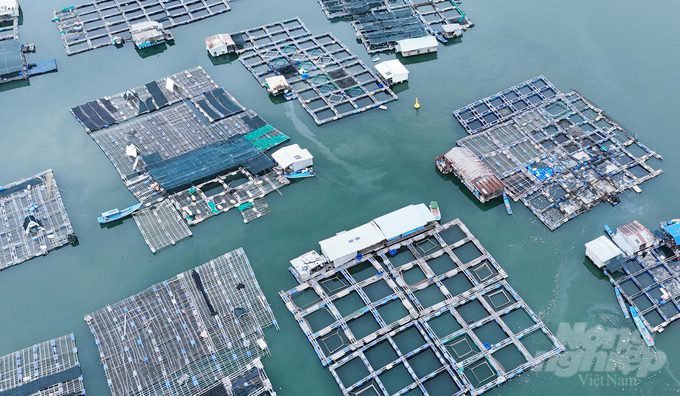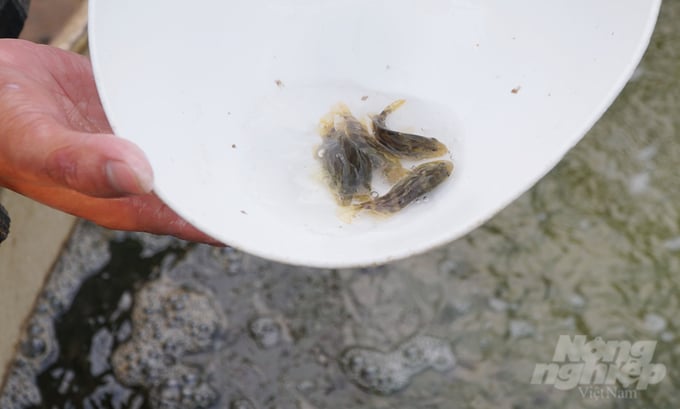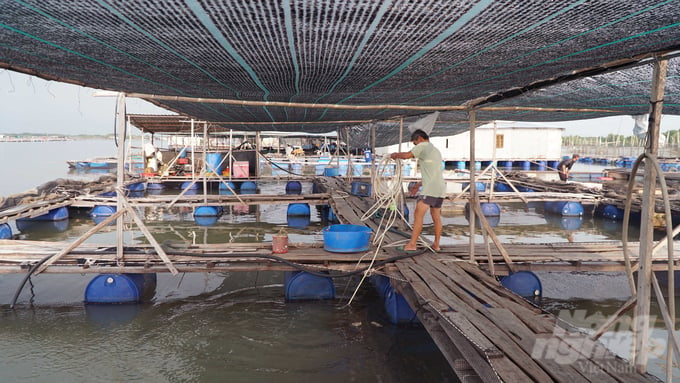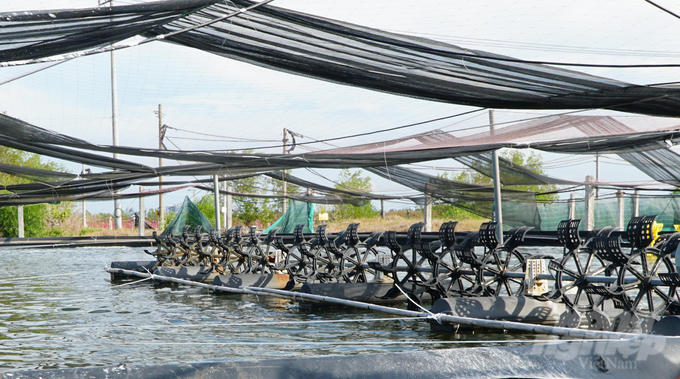May 30, 2025 | 12:25 GMT +7
May 30, 2025 | 12:25 GMT +7
Hotline: 0913.378.918
May 30, 2025 | 12:25 GMT +7
Hotline: 0913.378.918

Open aquaculture, which depends on the natural environment, is always subject to negative impacts from the weather. Photo: Le Binh.
Despite carefully preparing for disease prevention since the beginning of the year, lobster and fish cages of Le Ngoc Nam (village 9, Long Son commune, Vung Tau city) were still affected. The fish loss rate was higher than normal.
“Although the rate of fish getting sick is lower and they don’t stop eating as much as before, overall productivity is not good. Hopefully, when the weather is less rainy and windy, the fish cages will be in better conditions,” Nam said.
Information from Ba Ria - Vung Tau Hydrometeorological Station shows that from August to September every year, the province experiences a lot of rain and is affected by storms and tropical depressions. Rainwater from the shore flows down, causing the salinity of the river water to suddenly decrease, causing shock and making the fish stop eating. There is a possibility that rainwater carries impurities from the shore, causing the water source to lack oxygen locally. This may be the main reason why the fish lose their slime and die quickly.
As of date, the disease situation in aquatic products in the province is not too serious as it only occurs on a small scale. Aquatic products affected by the disease are mostly from open farms which are greatly affected by weather and environmental pollution.

Standard seeds of good quality are also an important factor in limiting diseases in aquaculture. Photo: Le Binh.
According to Huynh Van Them, Deputy Head of Ba Ria - Vung Tau Sub-Department of Livestock Production and Animal Health, since the beginning of 2024, the disease area on commercial shrimp is 4.8 ha, down 71.25% compared to the same period in 2023. Shrimp infected with Acute Hepatopancreatic Necrosis Disease (AHPND) mainly occurred in shrimp farming households in Phuoc Thuan commune, Xuyen Moc district.
“The Sub-Department of Livestock Production and Animal Health has coordinated with the locality to provide chemicals and treat the disease. The aim is to isolate the diseased ponds from surrounding ponds and treat the water environment to kill pathogens before discharging the water outside. The disease situation at affected households has been under control without any sign of widespread,” he said.
During the monitoring process, Ba Ria - Vung Tau did not detect any cases of juvenile fish and caged fish infected with neuronecrosis disease. However, last October, there was an unusual fish death in the area. The Sub-Department has instructed farmers on treatment measures to minimize damage caused by the disease.

Aquaculture farmers install oxygen supplement systems for fish cages during stagnant water days. Photo: Le Binh.
In the Cha Va and Dinh rivers, many households raising fish in rafts regularly clean their cages to provide a well-ventilated environment for the fish. The cage-raising household of Doan Thi Nga is an example. They often use an oxygenation system to 'recharge' the fish. Nga in particular often runs this system from 9pm to 6am, because at this time of the day, the oxygen content in the water is at its lowest, making it easy for the fish to die.
“We were instructed by veterinary officers to perform this technique when the water level is low or still. This method does not cost much while the fish can avoid the risk of lack of oxygen, diseases or unusual deaths,” said Nga.

Applying advanced technologies will help aquatic animals avoid negative impacts of extreme weather. Photo: Le Binh.
Technician Doan Van Nam, Head of the Office of Aquaculture, Ba Ria - Vung Tau Department of Fisheries, recommends farmers use large-sized juveniles that have been raised before being put into commercial farming. It is also considered crucial to thoroughly renovate the pond in order to eliminate pathogens in the pond and manage the pond environment and aquatic health.
“For whiteleg shrimp in particular, individuals and organizations are encouraged to apply effective farming models such as models applying 2-3 stage farming, biotechnology, circulation systems, and fewer water changes. These are models that bring high economic efficiency but low risk of disease,” said Technician Nam.
The agricultural sector of Ba Ria - Vung Tau province also encourages aquaculture farmers to apply high technology or closed models, and proactively adapt to climate change to prevent diseases. Many advanced technologies are also being used by businesses in aquaculture, which include shrimp farming with water circulation systems, farming with a covered tarpaulin system, using biological products to improve water sources, etc.
Translated by Samuel Pham

(VAN) Ms. Nguyen Thi Dung, Deputy Director of Ngoc Hoang Cooperative, shared about the journey of bringing dragon fruit to Europe, achieving annual revenues in the billions of VND.

(VAN) Bamboo products from Thang Tho Bamboo Cooperative have reached many countries around the world, while also creating jobs for local workers.

(VAN) The Management Board of Con Dao National Park reported that a green sea turtle, tagged in the Philippines, has traveled thousands of kilometers to lay 84 eggs on Bay Canh Islet.

(VAN) Green technology is paving a new path for sustainable aquaculture in the Mekong Delta in particular and across the country in general, helping reduce emissions and adapt to climate change.

(VAN) On May 27, La French Tech Vietnam (the French startup and innovation community in Vietnam) held the French Tech Summit Vietnam 2025.
/2025/05/27/4731-2-223159_980.jpg)
(VAN) No votive paper, no styrofoam, no plastic bags, no plastic bottles, and no single-use plastic trays are the key rules tourists should keep in mind when visiting Con Dao.

(VAN) In the fight against plastic pollution, Vietnam has been demonstrating a proactive, pioneering, and active role in addressing the greatest environmental challenge today.